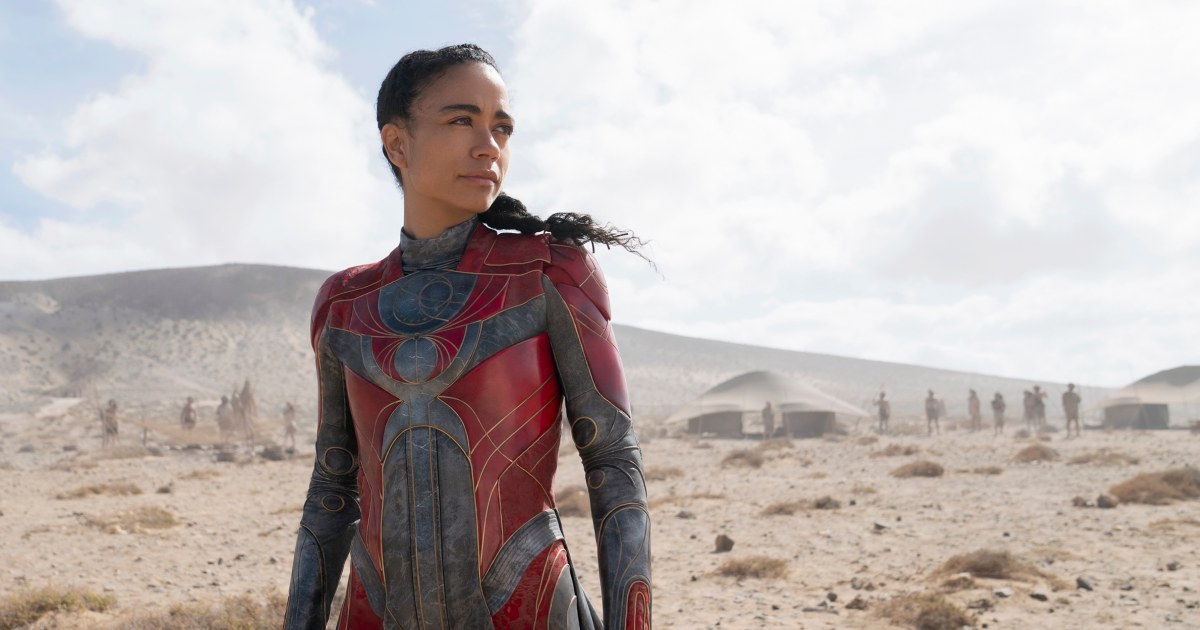
“Eternals” star Lauren Ridloff makes history this weekend as the first deaf performer to appear in a Marvel movie. But the Tony-nominated performer is quick to shake off the “historic” label, instead paying tribute to the actors who blazed a trail for this milestone.
“I would not be where I am now if it wasn’t for the deaf talent in the past and before me,” Ridloff said Friday through an American Sign Language interpreter in an interview on Zoom. “They made an impact and cleared the path for me to get here.”
“Eternals,” the 26th installment in the Marvel Cinematic Universe (MCU), features an ensemble cast — one of the most diverse lineups yet assembled by the franchise: Gemma Chan, Kumail Nanjiani, Salma Hayek and Brian Tyree Henry are among the key players.
Ridloff, 43, plays Makkari, an Eternal endowed with the power of superspeed. She talked about her debut in the MCU, the representation of deaf performers in Hollywood, and her role on the hit series “The Walking Dead.”
The conversation has been lightly edited for length and clarity.
NBC News: The Eternals are new to the MCU. How familiar were you with these characters before you got the role of Makkari? Did you grow up with Marvel or superhero mythology more generally?
The Eternals were definitely new to me. I had never heard of this group before. I mean, I knew who [Eternals creator] Jack Kirby was and I was a Marvel comic book fan growing up.
Great story, actually. When I was little, I broke into my sister’s room and stole a box of her Marvel comic books, which were filed in a very neat, precise way. My sister had a very specific set-up with her comic books, and she had forbidden me from actually looking at them. I took them out of her room, went out into the backyard and started reading them. I remember that moment, that discovery. The mythology, with so much color and action.
For some reason, I forgot about the comic books. I left them outside, and then it rained. In a way, this is my apology to my sister, doing this movie.
Chloé Zhao has such a distinctive directorial sensibility. What was your experience collaborating with her and watching her work?
It definitely felt chaotic at times, to be honest. There were moments where, you know: Wait, does this woman know what she’s doing? But then I realize now, that’s just the beauty of her work. Chloé puts so much trust in the people she works with, whether it’s the cast or the crew.
I feel like Chloé has a few beliefs that she wants to bring to the MCU, and she definitely trusts the actors to follow through. I feel like Chloé really wants to keep things organic. She watched us, off-screen, just to see what we were like and how we interacted with each other. She took us out on a boat trip, hung out with us.
Looking back on it, now I understand why the script changed day to day. That’s what was so crazy for all of us. But now, I definitely appreciate it, because I feel like, in the end, it was authentic.
You are making history with this performance. You are the first deaf superhero in the MCU. How does it feel to be at the center of this milestone for the genre and the industry?
That’s definitely heavy. I don’t know if I would agree with you on that, because I do want to say, first of all, that there’s a lot of deaf talent out there. I would not be where I am now if it wasn’t for the deaf talent in the past and before me. They made an impact and cleared the path for me to get here. I hope to continue carrying that for more talent to come, to carry that torch.
Of course, I’m thrilled about the movie. But I think the opportunity that the movie then presents to me, as Lauren — as a deaf, Black, Mexican woman — is that people are willing to listen to my own story and my own experience.
I can touch on my differences, my different intersectionalities of identity, and hope that, by bringing my story to the audience, people from marginalized communities will feel that there’s room for their own stories and their own narratives.
In the last couple years, there has been slightly more visibility on screen for characters who are deaf or hard of hearing. I’m thinking of projects like “Sound of Metal,” “CODA,” Millicent Simmonds in both of the “A Quiet Place” movies. What do you think accounts for this shift we’re starting to see?
I feel that, in general, viewers are so much more experienced now. TV and film are huge parts of our lives, and they have been for generations now. I think the tropes that we have seen over and over again — people are ready for something new and more real.
I do understand that a lot of people look to movies to escape. But at the same time, we’re also looking for something to believe in: beliefs and values, to see what’s relevant today.
I feel like Hollywood now realizes that people are ready for those kinds of stories, and they’re just recently beginning to understand how to share the same space with a deaf actor and bring them into the story through the use of different resources, like an American Sign Language consultant.
It just so happens that my husband worked as the ASL consultant on most of the projects you just mentioned. I think that having another person — not just a deaf actor, but also the consultant or a [deaf] writer or a deaf producer — would give people behind the project a lot more confidence that they’re telling the story in an authentic way.
When it comes to both representation and access, what are some changes you would like to see in the film industry at large?
I know that people have an idea about accessibility; subtitles are not a new concept. But I think people are starting to see that when we talk about accessibility, it actually comes with the idea of universal design, which basically means that accessibility is for everybody. It’s not just for the deaf and hard of hearing community. It’s not just for people with a disability. It’s literally for everybody.
Representation isn’t just in front of the camera. It’s also behind the camera. We need more representation in pre-production, in the writers’ room, in the crew. I feel that the more representation we actually have in that space, the better the stories are going to be at the end.
I think a lot of our readers will know you from your role on “The Walking Dead,” which has been on the air for more than a decade. Why do you think the series resonates so strongly with people in the U.S.?
“The Walking Dead” is just brilliant in how they actually incorporate real life and weave it into the storylines.
When the pandemic happened, so many people reached out to me directly and asked me for suggestions on how to survive this quote-unquote “apocalypse.”
I feel like “The Walking Dead” is just a wonderful mirror of real life, and that’s why it’s so successful. If you look at the cast, it is so diverse, but that’s not what drives the story at all. “The Walking Dead” looks very much like the world at large that we live in — not including the Walkers, but you know what I mean.
Source: | This article originally belongs to Nbcnews.com









